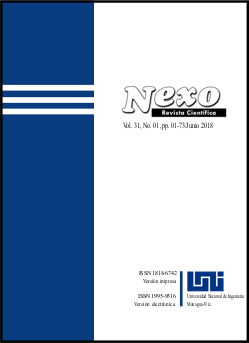Isolation and molecular identification of microorganisms associated with sugarcane (Saccharum officinarum) CP 722086 variety
DOI:
https://doi.org/10.5377/nexo.v31i01.6455Keywords:
Sugarcane, Microorganisms, Biotechnology, Sustainability, Climate change.Abstract
The cultivation of sugar cane contributes to the Nicaraguan economy generating 6.9% of the national GDP in 2016. Currently, it is at risk the growth of the sugar industry and its transformation into a bio factory, both by poor agricultural practices (excessive use of agrochemicals and soil degradation) as by the effects of climate change, ranging from droughts to emerging diseases and pests.One of the most promising alternatives for dealing with the problem is the knowledge of the native microorganisms (pathogens and beneficial) associated with the main crops and be able to make sound management decisions. In this work, we isolate these microorganisms, we identified them at the DNA level and obtained information of its role and relationship with the culture, constituting a biological database that will be used for the development of biological products and improved control strategies for emerging pathogens. This pioneering research developed in Nicaragua, focused on the microbiotic associated to the cultivation of sugarcane and contributes to the understanding of the plant-soil system relationship. These results are inputs to agricultural innovation, mitigation of the effects of climate change and environmental sustainability.
Downloads
Downloads
Published
How to Cite
Issue
Section
License
The authors who publish in Nexo Scientific Journal agree to the following terms:
- Authors retain the copyright and grant the journal the right of the first publication under the license Creative Commons Attribution License https://creativecommons.org/licenses/by/3.0/, which allows others to share the work with a recognition of the authorship of the work and the initial publication in Nexo Scientific Journal.
- Authors may separately establish additional agreements for the non-exclusive distribution of the version of the work published in the journal (for example, in an institutional repository or a book), with the recognition of the initial publication in Nexo Scientific Journal.
- Authors are allowed and encouraged to disseminate their works electronically (for example, in institutional repositories or in their own website) before and during the submission process, as it can lead to productive exchanges, as well as earlier and greater citation of published works.











